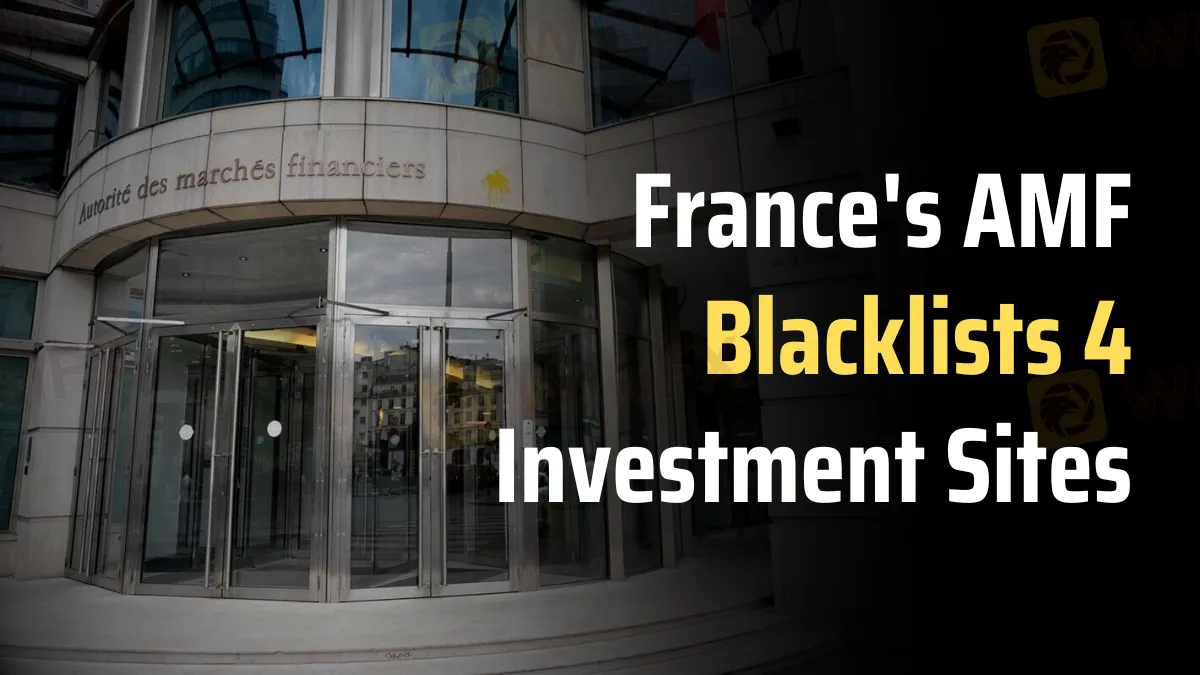简体中文
繁體中文
English
Pусский
日本語
ภาษาไทย
Tiếng Việt
Bahasa Indonesia
Español
हिन्दी
Filippiiniläinen
Français
Deutsch
Português
Türkçe
한국어
العربية
France's AMF Blacklists 4 Investment Sites
Abstract:France's AMF has blocklisted 4 unregulated investment sites for unauthorized services and suspected scam operations. Investors are urged to stay vigilant against fraud.

The Autorité des Marchés Financiers (AMF), France's financial markets regulator, has added four investing websites to its blocklist. These websites were operating without sufficient licenses, providing professional investing services to domestic customers, which is a criminal crime in France. The AMF thinks that these unregulated forex brokers are operating scams and has thus denied them permission to deal with French consumers.
The banned companies have been participating in unlawful activity, such as making unsolicited calls and sending out emails promoting online trading, financial consulting, and credit services without the proper permissions. This absence of permission raises serious issues about their validity and the hazards they might bring to investors.
The AMF has taken a proactive approach to regulating the cryptocurrency sector, issuing warnings and forbidding the promotion and sale of bitcoin derivatives. To safeguard investors, the regulator requires brokers providing such products to follow a strict set of requirements. Despite these safeguards, the cryptocurrency industry remains a significant source of fraud in Europe. Many of the businesses on the AMF's blocklist claim to be headquartered in France, but the majority of the reported addresses are bogus, indicating that the enterprises are really operating from abroad.

The newly blocklisted sites include:
www.financiere-alegia.com
www.financiere-dainville.com
www.placementsmart.fr/ferme-solaire
prénom.nom@sogescap-gestion.com
The AMF continues to receive complaints of people falling victim to scams utilizing fraudulent platforms masquerading as regulated providers of “savings accounts” and proposing to acquire stock in publicly traded firms. The regulator warns the public to be wary of stock suggestions from social media and messaging applications. These proposals are often made by offshore 'brokers' who approach prospective victims with promises to sell risky or worthless investments. Some investors have lost a lot of money as a result of these crooks' convincing tactics.
The “pump and dump” plan, which often involves penny stocks, is a typical swindle. Fraudsters try to boost stock prices by spreading fake positive information, such as claims about finding coronavirus instances or creating a treatment for the sickness. These scams may cause significant financial loss to naive investors who believe the deceptive information.
The AMF's actions emphasize the significance of regulatory control in the financial markets in protecting investors from fraudulent schemes. The regulator asks the people to be watchful and report any suspicious activity to the authorities. As the environment of online trading and investing changes, strict laws and powerful enforcement methods become more critical in protecting investors' interests.

Disclaimer:
The views in this article only represent the author's personal views, and do not constitute investment advice on this platform. This platform does not guarantee the accuracy, completeness and timeliness of the information in the article, and will not be liable for any loss caused by the use of or reliance on the information in the article.
Read more

Authorities Alert: MAS Impersonation Scam Hits Singapore
MAS scam alert: Scammers impersonate officials, causing $614K losses in Singapore since March 2025. Learn how to spot and avoid this impersonation scam.

Billboard Warns of Crypto Scams Using Its Name – Stay Alert!
Billboard warns against fake crypto scams using its brand. Learn how to spot fraud and protect yourself from fake promotions.

The Impact of Interest Rate Decisions on the Forex Market
Interest rate changes determine currency attractiveness, influencing capital flows and exchange rate trends. Understanding this mechanism helps investors navigate the forex market effectively.

Rising WhatsApp Scams Highlight Need for Stronger User Protections
UK consumers lose £2,437 on average to WhatsApp scams. Revolut demands stricter verification and AI monitoring to combat rising fraud on Meta platforms.
WikiFX Broker
Latest News
The Withdrawal Trap: How Scam Brokers Lure Victims into Paying More
FCA to Investors: Think Twice Before Trusting These Brokers
Trump\s tariffs: How could they affect the UK and your money
Trump gambles it all on global tariffs he\s wanted for decades
TradingView Brings Live Market Charts to Telegram Users with New Mini App
Trump tariffs: How will India navigate a world on the brink of a trade war?
Interactive Brokers Launches Forecast Contracts in Canada for Market Predictions
Authorities Alert: MAS Impersonation Scam Hits Singapore
IG Group Acquires Freetrade for £160M to Expand UK Investment Market
U.S. March ISM Manufacturing PMI Released
Currency Calculator







